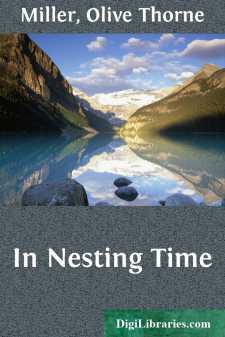Categories
- Antiques & Collectibles 13
- Architecture 36
- Art 48
- Bibles 22
- Biography & Autobiography 813
- Body, Mind & Spirit 138
- Business & Economics 28
- Children's Books 12
- Children's Fiction 9
- Computers 4
- Cooking 94
- Crafts & Hobbies 4
- Drama 346
- Education 46
- Family & Relationships 57
- Fiction 11821
- Games 19
- Gardening 17
- Health & Fitness 34
- History 1377
- House & Home 1
- Humor 147
- Juvenile Fiction 1873
- Juvenile Nonfiction 202
- Language Arts & Disciplines 88
- Law 16
- Literary Collections 686
- Literary Criticism 179
- Mathematics 13
- Medical 41
- Music 40
- Nature 179
- Non-Classifiable 1768
- Performing Arts 7
- Periodicals 1453
- Philosophy 64
- Photography 2
- Poetry 896
- Political Science 203
- Psychology 42
- Reference 154
- Religion 505
- Science 126
- Self-Help 81
- Social Science 81
- Sports & Recreation 34
- Study Aids 3
- Technology & Engineering 59
- Transportation 23
- Travel 463
- True Crime 29
In Nesting Time
Categories:
Description:
Excerpt
BABY BIRDS.
"Ears have they, but they hear not," may be said of all the world. Tragedies and comedies go on continually before us which we neither see nor hear; cries of distress and prattle of infants, songs of love and screams of war, alike fall upon deaf ears, while we calmly discuss the last book or the news from Borriboo-lah-Gha, as completely oblivious as if all this stirring life did not exist.
To be sure these things take place in the "upper stories," as Thoreau says, but they are none the less audible, and one is tempted to believe that bird voices are on a scale to which the untrained ear is not attuned. Once learn to hear, and nature is full of life and interest. The home affairs of our little neighbors whose modest cottage swings on a branch of the elm beside the door are more attractive than those of our fellow creatures in the house across the way partly because they are so open in their lives that our attentions do not seem intrusive, but more because their ways are not so familiar. We can guess how men and women pass their time, but we cannot guess why the cat-bird always sings from the middle of one particular shrub, nor where he has hidden his dusky spouse and nest full of babies; and after we know him we are eager to discover.
Upon reaching the charming home of a friend in Massachusetts last June, almost the first thing I saw was a pair of purple crow blackbirds in trouble. First arose a medley of queer husky tones, clamorous baby cries, and excited oriole voices, with violent agitation of the leaves of a tall elm, ending with the sudden exit of a blackbird, closely followed by a pair of Baltimore orioles. The pursued flew leisurely across the lawn, plainly in no haste, and not at all with the air of the thief and nest robber he is popularly supposed to be. Clearly the elm belonged by bird custom to the orioles, for their pretty swinging hammock could be seen partly hidden by leaves, about halfway up the tree, and what business other than that of marauder had the sombre-hued enemy upon it?
Now the blackbird has no secrets in his life; the whole world is welcome to know his affairs, and in fact he proclaims them loudly himself. It was easy to see that he had anxiety enough of his own just then, without thinking of disturbing his neighbors, for he was engaged in the task of introducing his young family to the world, and every bird watcher knows that is attended with almost as many difficulties as is the same operation in what we call "society."
If the youngster escape the dangers peculiar to the nest, the devouring jaws of squirrel or owl, the hands of the egg thief, being shaken out by the wind, smothered by an intrusive cow-bunting, or orphaned by the gun of a "collector;" if, neither stolen, eaten, thrown out, nor starved, he arrives at the age that his wings begin to stir and force him out of the leafy green tent of his birth, a new set of dangers meet him at the door. He may entangle himself in a hair of the nest-lining, and hang himself at the very threshold of life—a not uncommon occurrence; or he may safely reach the nearest twig and from there fall and break his neck—not a rare accident; he may be attacked by a bird who questions his right to be on the tree; he may fly, and, not reaching his goal, come to the ground, an easy prey to any prowler....













